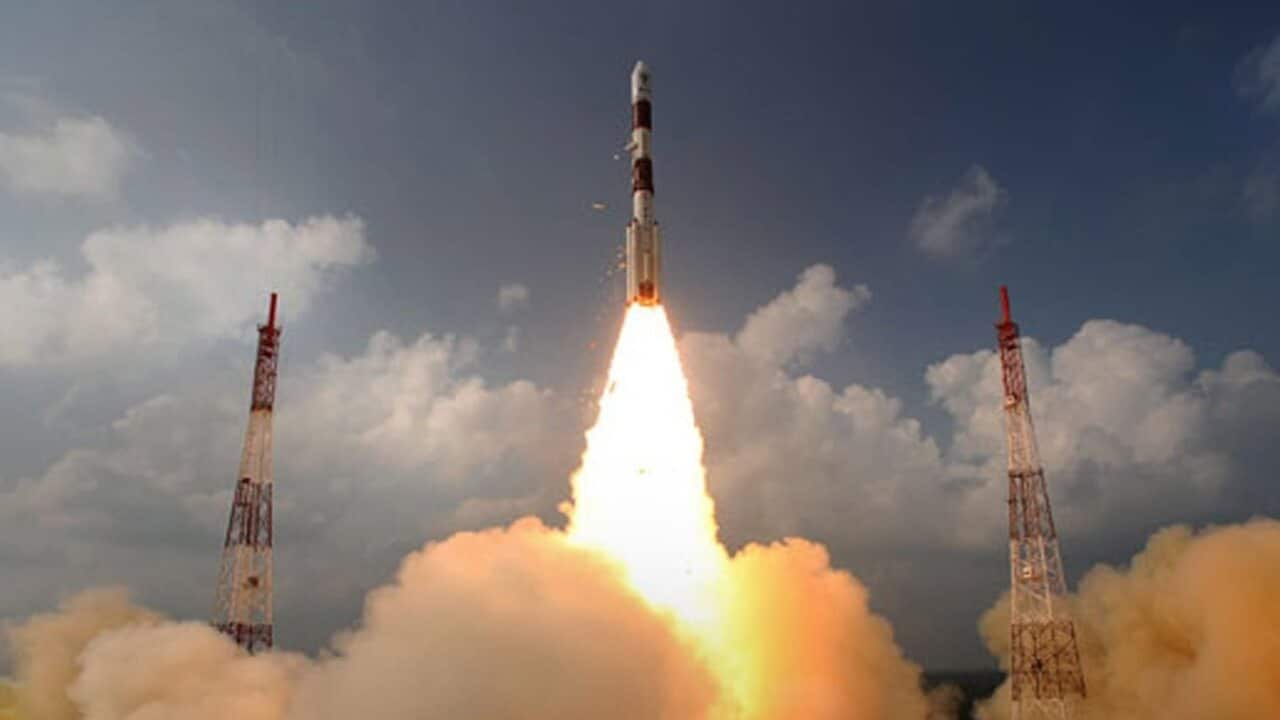(Transcript from World News Australia Radio)
India has successfully launched its first mission to Mars, aiming to put a probe in orbit around the Red Planet at a lower cost than previous missions.
It potentially positions the emerging Asian nation as a budget player in the global space race.
The low cost of the mission has attracted admiration but it hasn't stopped questions about whether India can afford inter-planetary travel when so much of its population lives in poverty.
Kerri Worthington reports.
(Click on audio tab above to listen to this item)
The Mars Orbiter Mission blasted off from the Satish Dhawan Space Centre in Andhra Pradesh on schedule.
Applause broke out in the tense control room as navigation ships in the South Pacific confirmed that the spacecraft had successfully entered orbit around Earth.
"Lift off. Lift off normal" (Applause and background of people speaking) "Performance normal".
Shortly afterwards, the chief of India's Space Research Organisation, K. Radhakrishnan, said all had gone according to plan.
"Subsequent to the injection of the Mars Orbiter spacecraft into the elliptical orbit, there have been several operations performed on the spacecraft. I am happy to announce that the spacecraft is in good health and it has done the tasks that were intended to be done."
The spacecraft is scheduled to start orbiting Mars by September next year and will search for methane, which could provide evidence of some sort of life form on the fourth planet from the Sun.
However, Indian space technology expert Ajey Lele - speaking to Chinese Central Television - says the mission will face technical and environmental challenges during the course from Earth to outer space.
"India has to got a rocket which is not able to lift up a satellite which is too heavy in nature. Hence, India's using its polar satellite launch vehicle, which will put a satellite of around 1300 kilograms out into space. And this will travel millions of kilometres of distance to reach Mars. And it will take around 300 days of time to travel that distance. So in those 300 days' time it will encounter various adverse atmospheric conditions and the rocket has to withstand all those conditions."
Only the United States, Europe, and Russia have sent probes that have orbited or landed on Mars.
Such probes have a high failure rate and a success will be a boost for Indian national pride, especially after a similar mission by China failed to leave Earth's orbit in 2011.
The Mars Orbiter Mission, known as "Mangalyaan" in India, was revealed only 15 months ago by Prime Minister Manmohan Singh.
But the Space Research Organisation's K. Radhakrishnan dismisses talk of a 'space race' to the Red Planet between India and China.
"We are not in race with anybody else but we are in race with ourselves to excel in the areas chartered out for ourselves."
India's space program began 50 years ago, spurred later by Western-imposed sanctions in response to a nuclear weapons test in 1974.
Five years ago, its Chandrayaan probe landed on the Moon and found evidence of water.
The Mars probe's 4.5 billion rupee price tag - which is about $A73 million - is a fraction of the cost of a Mars mission by the United States' space agency, NASA, also due to launch this month.
Some analysts have predicted India could capture more of the $300-billion global space market with its low-cost technology.
The Indian program has to contend with critics who say a country that struggles to feed its people adequately should not be splurging on space travel.
But one of the leaders of the Euro-Russian ExoMars expedition, due to take off in 2018, says space exploration and poverty amelioration need not be mutually exclusive.
Professor Andrew Coates has told the BBC India's space technology has stemmed from its development of practical things like communications and weather satellites.
"So that can actually directly help people. In fact, with the recent cyclone in India satellite measurements actually saved many, many lives. So in addition to that the sort of raising the whole expectations of the nation and building the technological possibility of actually making these types of measurements and all the technology which goes with that means high-tech jobs on the ground."
Share

